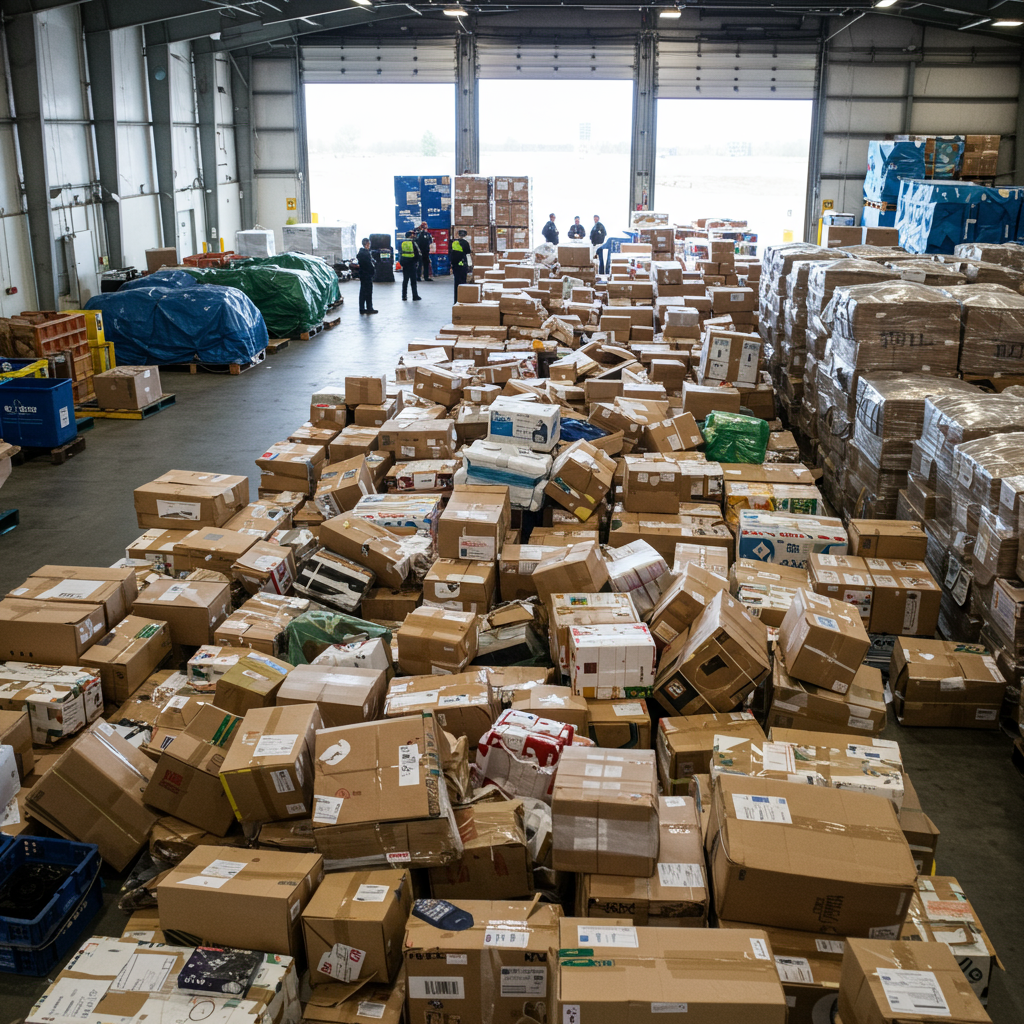The United States has reportedly halted certain weapons shipments destined for ukraine. This significant decision stems from growing concerns within the Pentagon regarding the current state of America’s own military stockpiles. Officials indicate that years of providing critical defense aid to Ukraine, coupled with extensive military operations in the Middle East, have significantly depleted key munitions reserves.
This pause marks a notable moment in U.S. support for Kyiv’s defense against Russia’s ongoing invasion. While the move is presented by the White House as prioritizing “America’s interests,” it has sparked apprehension about its potential impact on the conflict’s trajectory and Ukraine’s ability to defend itself amidst intensified Russian aerial attacks.
Pentagon Orders Pause Amid Stockpile Review
Defense Secretary Pete Hegseth is reported to have ordered the halt on specific shipments of missiles and ammunition. This directive came weeks after Hegseth initiated a comprehensive review of U.S. military stockpiles. Multiple defense officials, congressional sources, and individuals familiar with the decision confirmed the pause. The review aims to assess the readiness and sufficiency of the nation’s weapons inventory following sustained demand from various global commitments.
Officials indicated that the delivery of these weapons could be delayed at least until the assessment is fully completed. Furthermore, if the review identifies critical shortages or determines that the munitions are urgently needed elsewhere around the globe, their transfer to Ukraine could be postponed indefinitely. The timing of this pause is viewed with concern by some, given the current intensity of the conflict in Ukraine.
What Specific Weapons Are Affected?
The delayed shipment represents a substantial consignment of advanced military hardware critical to Ukraine’s defense efforts. According to sources familiar with the decision, the pause impacts several key weapon systems.
These include dozens of Patriot interceptor missiles, vital for Ukraine’s layered air defense against incoming Russian ballistic and cruise missiles. Also held back are thousands of 155 mm high explosive Howitzer munitions, a backbone of Ukrainian artillery on the front lines. The shipment further includes over 100 Hellfire missiles, more than 250 precision-guided GMLRS (Guided Multiple Launch Rocket System) rounds, and dozens each of Stinger surface-to-air missiles, AIM air-to-air missiles, and grenade launchers. These weapons are essential for Ukraine to counter Russian forces, protect its cities, and conduct offensive operations.
Why Are U.S. Stockpiles a Concern?
The rationale behind the Pentagon’s decision is directly tied to the significant strain placed on U.S. munitions stockpiles over recent years. A primary driver of this depletion has been the extensive provision of military aid to Ukraine since Russia launched its full-scale invasion in February 2022. The United States has been a leading supplier, having delivered over $66 billion worth of weapons and assistance to Kyiv.
Simultaneously, the U.S. military has been engaged in nearly two years of continuous operations in the Middle East. This includes combating Houthi rebels in Yemen and actively defending Israel and other allies against threats from Iran and its proxies. These operations require the expenditure of various types of munitions, further drawing down U.S. reserves. Acting Chief of Naval Operations Adm. James Kilby testified before Congress recently, warning that while some specific missile types like SM-3s were currently sufficient, the overall rate of using certain missiles and munitions had become “alarming.” This testimony highlights the growing concerns about the sustainability of current expenditure rates without impacting U.S. readiness or ability to respond to other global contingencies.
White House and Administration Perspective
White House spokeswoman Anna Kelly publicly addressed the decision. She stated that the move “was made to put America’s interests first” following a Department of Defense review of U.S. military support and assistance provided to other countries globally. Kelly asserted that the strength of the United States Armed Forces remains “unquestioned.”
The pause reflects a shifting set of priorities under the new administration. President Donald Trump, speaking after a recent NATO meeting, acknowledged Ukraine’s strong desire for Patriot air defense missiles. However, he also noted the difficulty in obtaining them and the need for the U.S. to maintain its own supply, particularly for supporting allies like Israel. Defense Secretary Pete Hegseth testified in June about redirecting funding towards administration priorities, including efforts to secure a negotiated peace between Russia and Ukraine, which he argued makes America look strong. He also stressed the importance of European nations increasing their own defense contributions. While some security spending for Ukraine previously approved was still in the pipeline, Hegseth indicated such robust assistance would be reduced moving forward.
Ukraine’s Reaction and Urgent Needs
News of the weapons halt has been met with sharp disappointment and concern in Kyiv. Ukrainian officials view the delay as potentially detrimental to their ongoing defense efforts. Fedir Venislavskyi, a senior member of Ukraine’s parliamentary defense committee, described the Pentagon’s decision as “painful” and “very unpleasant.” He emphasized that this comes at a time when Russia continues its “terrorist attacks” against the country, underscoring the immediate need for consistent military support.
Ukraine’s Foreign Ministry summoned the deputy chief of the U.S. embassy in Kyiv to a meeting to discuss the situation. During this meeting, Ukrainian representatives reportedly stressed that any delay or hesitation in supporting Ukraine’s defense capabilities would only embolden Russia and contribute to prolonging the conflict. Ukraine has repeatedly appealed for additional U.S. and European air defense weaponry. Russian forces have significantly stepped up their aerial attacks in recent months, launching large-scale strikes involving numerous missiles and drones, making air defense systems like Patriots critically necessary to protect cities and infrastructure.
Context of the Conflict and Negotiations
The pause in shipments occurs at a critical juncture in the conflict. Russia has recently launched some of its largest aerial assaults since the full-scale invasion began in 2022. While President Trump and some Republican allies have expressed interest in securing a permanent ceasefire, peace talks between Ukraine and Russia have reportedly stalled.
Some analysts and officials are concerned about the timing of the U.S. aid pause, even though new administrations sometimes review existing commitments. An official familiar with the situation reportedly voiced concerns that Ukraine needs to project military strength on the battlefield to create conditions favorable for meaningful negotiations with Russia. Ukrainian President Volodymyr Zelenskyy’s top adviser, Andriy Yermak, previously stated in June that while Ukraine was holding back Russian forces, more air defense systems were urgently needed to safeguard Ukrainian cities. Some reports also mentioned a prior claim by Zelenskyy in June that the U.S. had diverted certain anti-drone missiles intended for Ukraine to forces in West Asia instead, adding another layer to the discussion around aid distribution.
The affected weapons shipments had been previously approved under Presidential Drawdown Authority and Ukraine Security Assistance Initiative packages during the preceding administration. While some of these materials were already located within the region, they were reportedly stopped before being transferred to Ukraine following the Pentagon’s decision. The current situation highlights the complex interplay between U.S. domestic readiness, global military commitments, evolving foreign policy priorities, and the pressing needs of partners like Ukraine.
Frequently Asked Questions
Why did the US pause weapon shipments to Ukraine?
The United States reportedly paused certain weapons shipments to Ukraine due to concerns about the depletion of its own military stockpiles. This decision followed a comprehensive review ordered by Defense Secretary Pete Hegseth to assess the readiness and sufficiency of U.S. munitions after years of providing aid to Ukraine and conducting operations in the Middle East. White House officials stated the move was made to prioritize “America’s interests.”
What specific weapons shipments were reportedly delayed for Ukraine?
According to sources familiar with the decision, the delayed shipments include crucial defense assets. The pause impacts dozens of Patriot interceptors, thousands of 155 mm Howitzer rounds, over 100 Hellfire missiles, more than 250 GMLRS precision-guided systems, and dozens each of Stinger and AIM missiles, as well as grenade launchers. These are vital weapons for air defense, artillery support, and various combat operations in Ukraine.
How has Ukraine responded to the halt in US military aid?
Ukrainian officials have expressed disappointment and concern over the pause in U.S. weapons shipments. A senior member of Ukraine’s parliament described the decision as “painful” and “very unpleasant.” Ukraine’s Foreign Ministry summoned a U.S. diplomat to emphasize that any delay in military assistance could embolden Russia and prolong the conflict, especially as Russia escalates its aerial attacks and Ukraine urgently requires more air defense systems.
Conclusion
The Pentagon’s decision to halt a shipment of critical weapons to Ukraine, driven by concerns over the state of U.S. military stockpiles, signals a potential shift in the dynamics of international support for Kyiv. While framed as a measure to put American interests first following a comprehensive review, the pause comes at a challenging time for Ukraine, which faces intensified Russian attacks and a pressing need for air defense systems and other munitions. The situation underscores the complexities of balancing domestic readiness, global military commitments, and the urgent requirements of partners in active conflict zones. The duration of this pause and its ultimate impact on the war in Ukraine remain subjects of close observation and concern.




